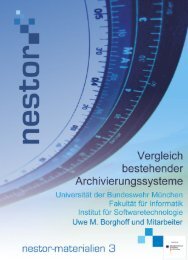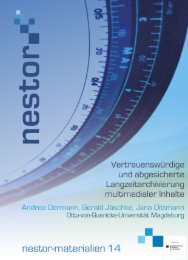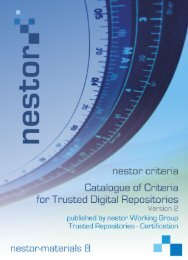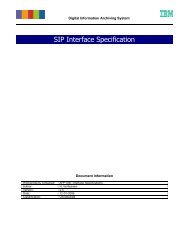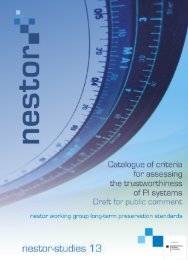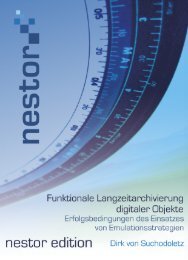Download (PDF, 9MB, Not barrier-free file.) - Nestor
Download (PDF, 9MB, Not barrier-free file.) - Nestor
Download (PDF, 9MB, Not barrier-free file.) - Nestor
- No tags were found...
You also want an ePaper? Increase the reach of your titles
YUMPU automatically turns print PDFs into web optimized ePapers that Google loves.
uses technology which the responsible IT-staff considered preferable (e.g. Java andJavaService Pages). On the other hand, the fact that DSpace has a wide internationaluser community, and that hence its ongoing development and support at this point seemfairly certain 58 , played a role in the decision as the availability and further development ofthe software is also an important consideration in the context of long-term preservation.There is, however, also a drawback to using DSpace for a German repository, as currentlyonly very few (if any) German developers contribute to the DSpace source code on aregular basis, which means that certain characteristics and aspects relevant only to theGerman repository landscape, such as the DNB's XMETADISS, are not implemented intoDSpace. 59 Contributions to DSpace source code follow very strict coding anddocumentation standards which are difficult to adhere to if one is not involved in DSpaceprogramming work full time. 60Like pedocs, JUWEL is currently preparing to apply for the DINI 2007 certificate.2.1.3 Qucosa (Quality Content of Saxony)Launched in July 2009, when it replaced a repository which had been in operationsince 1996, Qucosa 61 is a service hosted by the Sächsische Landesbibliothek – StaatsundUniversitätsbibliothek (SLUB) Dresden. It is co-funded by the European RegionalDevelopment Fund (ERDF). Further partners in this project are the academic andresearch libraries in Saxony.According to Dr. Andreas Kluge, head of the information technology department atthe SLUB Dresden and responsible for the management of Qucosa, a concern with issuesand questions of digital long-term preservation has existed at the SLUB Dresden for quitesome time, especially as in addition to Qucosa, the SLUB also operates a digitizationcenter. 62 The latter carries out mass digitization projects, among others, of manuscripts,maps and photographs.This awareness of long-term preservation and its concerns lead, for example, to aclose monitoring of the German kopal project 63 (see below) and to considerations toestablish a cooperative long-term preservation system for Qucosa drawing on servicesdeveloped by kopal. In order to pursue the possibilities offered by kopal further, an58 According to ROAR, on November 1 st , 2009 DSpace had 485 installations worldwide, thus making it therepository software with the biggest user community (see http://roar.eprints.org/).59 As the FZ does not have the right to award doctorate degrees (“Promotionsrecht”), the XMETADISSstandard is not relevant to JUWEL. In addition, German DSpace installations for university-basedrepositories exist, which must therefore have found a workaround for this problem. XMETADISS is,however, not part of the DSpace standard installation.60 See, for example, DSpace's Contribution Guidelines athttp://wiki.dspace.org/index.php/ContributionGuidelines – 31.10.2009. See also Salo (2007), whocomments on available repository software that “[...] the architectures of these software packages aredeeply innovation-unfriendly. DSpace and EPrints are heavily overengineered and written in Java and Perlrespectively, rather than one of the simpler Web-scripting languages such as PHP or Ruby. Even slightmodifications are out of reach of most members of 'the community' due to lack of specialized expertise andsteep learning curves” (no pag.).61 http://www.qucosa.de – 03.11.200962 http://digital.slub-dresden.de/digitalisierungszentrum/ – 03.11.200963 http://kopal.langzeitarchivierung.de/ – 03.11.200923



